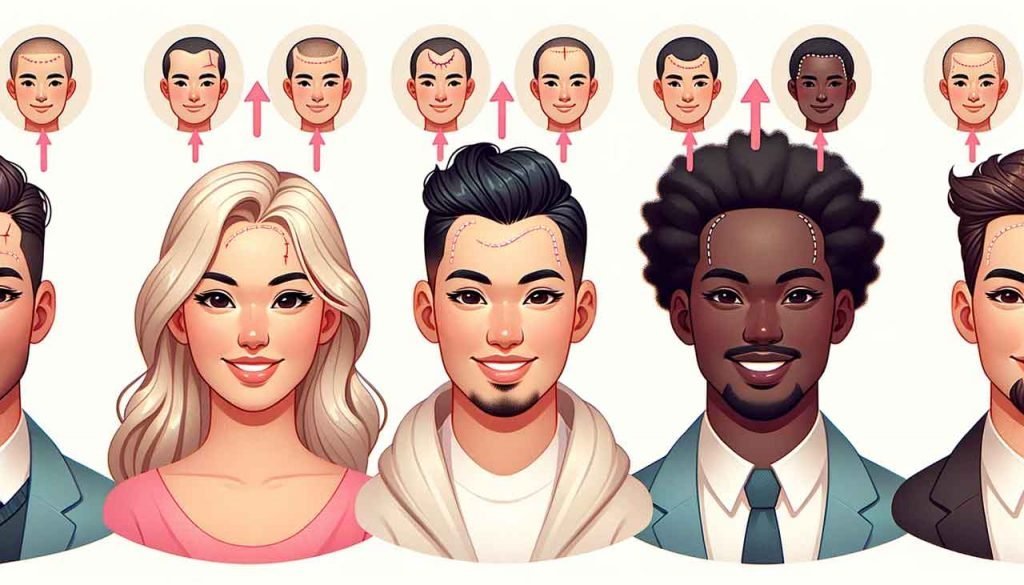You're ready for a change, and a hair transplant is on the horizon. But you're worried about scarring. Don't fret! You're not alone, and there are solutions. From choosing the right surgeon to post-care strategies and even treatments for existing scars, we've got your back. Let's walk this journey together and help you achieve that full, vibrant hair you've dreamed of, minus the scars. Dive in and learn how to minimize hair transplant scars with these simple steps.
Table of Contents

Understanding Hair Transplant Scars
In terms of understanding hair transplant scars, you'll find that they're typically a result of the procedure's technique, your skin's healing capabilities, and its characteristics like elasticity and thickness. Now, you're not alone in this journey. Many have walked this path before you, and feeling uncertain is okay. It's part of belonging to our community. Remember, we're here to guide you. The key to minimizing scarring lies in your hands, too. It's crucial to follow your surgeon's post-op instructions. Scars can vary from small, almost invisible ones to more noticeable ones. But don't worry, there are solutions. With the right treatment and care, you can reduce their visibility. Your scars do not define you, but your courage to face them.
Preventing Scarring From Transplants
Preventing scarring from transplants is the next step in our journey, and it's vital to understand that you've got a significant role to play in this process. Opting for a well-versed surgeon, adhering to post-operative care, and making smart choices can make a difference.
| Action | Impact | Your Role |
|---|---|---|
| Selecting a skilled surgeon | Reduces risk of scarring | Do your research |
| Following post-operative care | Promotes optimal healing | Be diligent |
| Using scar reduction products | Minimizes visible scars | Be proactive |
Dealing With Existing Scars
Dealing with existing scars from a hair transplant can seem daunting, but you've got various options to tackle them effectively. You're not alone in this journey, and there's a community that understands your struggles.
Here are some ways to address transplant scars:
- *Scar revision surgery*: a procedure that can minimize the appearance of scars.
- *Laser therapy concentrates light to break up scar tissue.
- *Scalp micropigmentation*: a tattoo technique that creates the illusion of hair.
- *Topical scar creams*: products designed to soften and reduce scars.
- *Steroid injections*: can flatten and reduce the appearance of scars.
Costs of Scar Revision Procedures
Understanding the cost breakdown of scar revision procedures is crucial, as it'll help you plan your budget and make informed decisions about your treatment. Costs can vary widely, depending on factors like the size and severity of the scar, the technique used for revision, and the surgeon's experience. You might be looking at a range from $1,500 to $7,500. This typically includes the surgeon's fee, anesthesia, and follow-up care. However, it might seem like a big investment; remember the long-term benefits, such as improved confidence and self-esteem. Like any community, we're here to support you through this journey. Remember, you're investing not just in your appearance but also in your personal and professional life.
Non-Surgical Scar Treatments
If you're concerned about the cost or the invasiveness of surgical treatments, there are non-surgical options you can consider to treat hair transplant scars. We're part of a community that values self-confidence and appearance, and we understand that every scar tells a story. Yet, you don't need to carry a visible one on your scalp. Here are some treatments for you:
- *Topical treatments*: Scar reduction creams and gels may help.
- *Silicone sheets*: These can reduce scar tissue over time.
- *Scalp microneedling*: Helps stimulate collagen production, improving the scar's appearance.
- *Platelet-rich plasma therapy*: Encourages healing and tissue regeneration.
- *Laser therapy*: Smooths out the scar and reduces redness.
Frequently Asked Questions
What Lifestyle Changes Can I Make to Promote Better Healing and Minimize Hair Transplant Scars?
Are you seeking ways to heal better and reduce hair transplant scars? Living a healthy lifestyle can work wonders! Eat balanced meals, stay hydrated, quit smoking, and reduce alcohol intake. Also, follow post-operation care instructions closely.
Are There Any Specific Foods or Supplements That Can Aid in Scar Healing and Reduction After a Hair Transplant?
Certain foods and supplements can aid in scar healing post-hair transplant. Vitamin C, zinc, and protein-rich foods promote healing. Omega-3 fatty acids can reduce inflammation. Hydration is also key, so drink lots of water.
Can the Location of the Donor Site on the Scalp Influence the Visibility and Severity of Hair Transplant Scars?
The donor site location can influence scar visibility. Skilled surgeons often choose less conspicuous areas. Following post-op care diligently, you'll further minimize scar severity. It's all about teamwork between you and your surgeon.
How Does the Number of Sessions or Grafts During a Hair Transplant Procedure Affect the Risk of Scarring?
More sessions or grafts can increase scarring risk. You're repeatedly damaging skin, making it harder to heal smoothly. It's crucial to follow aftercare instructions and trust your surgeon's judgment on the session and graft quantity.
Does the Length or Texture of My Hair Affect the Visibility of Hair Transplant Scars?
Yes, your hair's length and texture can affect scar visibility. Longer, thicker hair can hide scars better. However, skilled surgeons can minimize scarring, regardless of hair type. Proper aftercare also helps reduce visibility.
References:
Hair follicle transplantation on scar tissue
Keloid Scars Arising after Follicular Unit Extraction Hair Transplantation
Links:
The Guide to Hair Transplant: Procedure, Recovery, and Results

